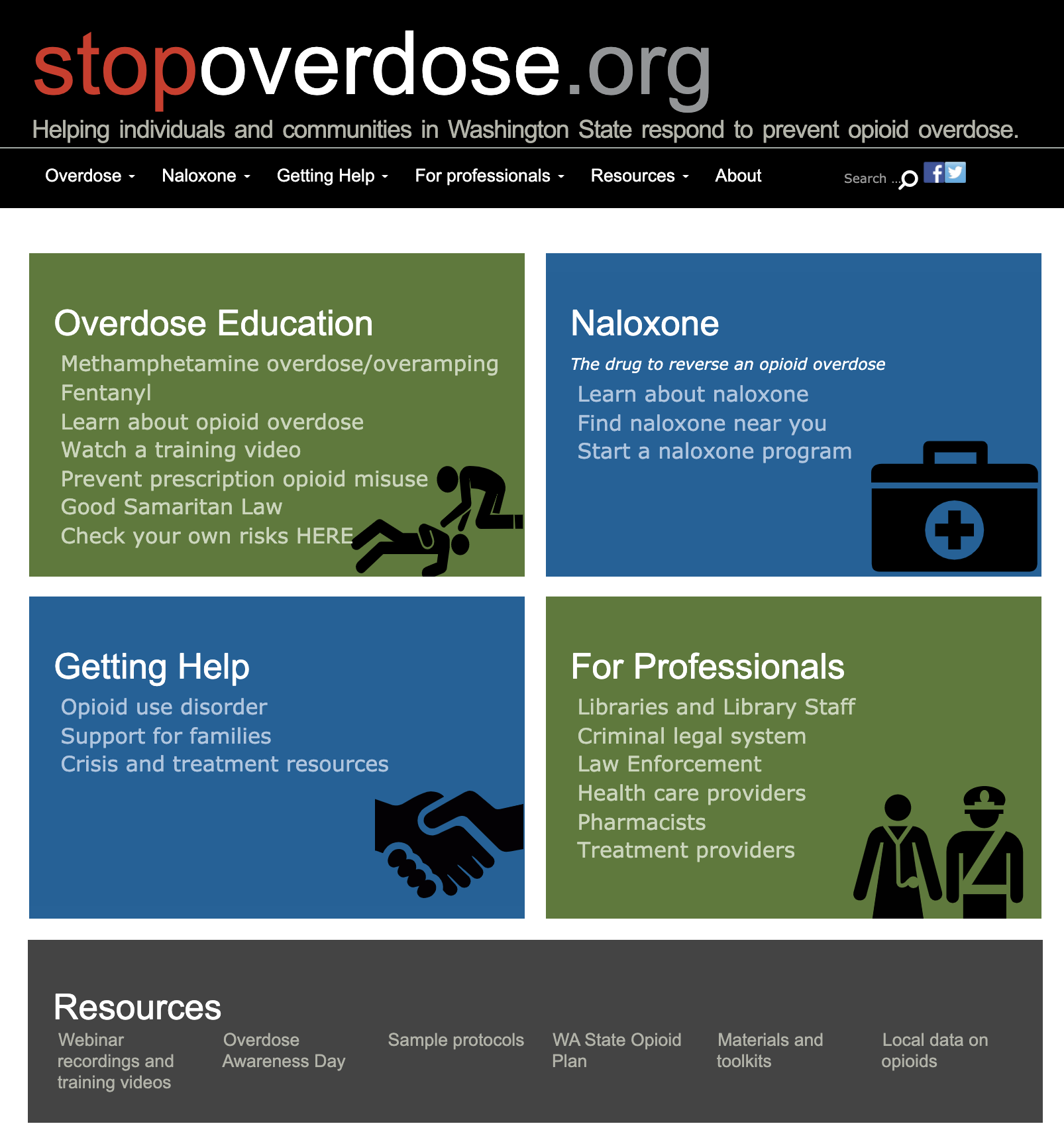By ATTC Network Coordinating Office Staff
As the opioid epidemic continues to spread across the country, communities grapple with soaring overdose rates. For Washington — a state whose fentanyl overdose deaths have doubled in the last year — Stopoverdose.org launched with the mission of helping individuals and communities in Washington State respond to prevent opioid overdose.
Stopoverdose.org is a Center for Drug Safety and Services Education (CDSSE) project at the University of Washington Addictions, Drug & Alcohol Institute (ADAI). CDSSE offers education and technical assistance for individuals, professionals, and communities in Washington State who want to learn to prevent and respond to overdose, and improve the health of people who use drugs.
Stopoverdose.org provides a repository of both local and national resources organized into four main areas: Overdose Education, Naloxone, Getting Help, and For Professionals. Although some aspects of the site are Washington-specific (accessing Naloxone locally, the Washington Recovery Helpline link, etc.), several general resources are also available.
Alison Newman, Continuing Education Specialist for ADAI, has provided training and education on overdose, opioids, and worked on Stopoverdose.org. She specializes in health education and healthcare access around drug use and health. Below, she discusses the features and objectives of the website.

Is there a specific demographic in Washington that Stopoverdose.org is hoping to reach?
Opioid overdosing is everywhere statewide. While there may be some variation from county to county, every community is grappling with this in its own way. The opioid crisis has been framed as a rural white issue, but we’re learning more and more, that's not the case. Washington sees growing deaths among Black people and our Latino population. For a long time, we have seen disproportionate deaths among our American Indian/Alaska-Native population, so this is an issue that affects all communities, and some more than others. It is important that we have resources for all of those different people in Washington State. There's no one type of person who's affected by overdose.
Stopoverdose.org specifically addresses both fentanyl and methamphetamine overdoses. Why do you think it’s essential to bring attention to both of these substances?
Often when people talk about overdose, they’re usually talking about opioid overdose. However, most overdoses are poly-substance, and many, especially in the West, involve methamphetamine. We went through a long process to create both a short- and long-form flyer about how to respond to methamphetamine overdoses and overamping. We spoke with several community partners, such as the state toxicologist; different doctors we work with, including ED docs; people at syringe services programs; and four different people who are currently using methamphetamine, about what they want people to know about when to get help.
There aren’t many resources on how to respond to methamphetamine overdoses or overamping, so we wanted to create something meaningful. Methamphetamine is a big cause of mortality. It’s a big concern for a lot of community members. We wanted to make sure there are resources around that because it's not just an opioid epidemic but an overdose epidemic involving many substances.
Fentanyl is definitely a growing issue of concern nationally and in Washington [state]. In Washington, we’ve seen our fentanyl overdose deaths double in the last year, and overdose deaths are up 38% overall — most of which are from fentanyl. We wanted to make a webpage with very straightforward, plain language information about fentanyl and aggregate the different resources that were out there and also to let people know it is safe to respond to fentanyl overdose.
Do you have any information on the website for an everyday person (someone not necessarily in the substance use disorder field) to learn more about overdosing?
Yes, we have an overdose brochure on the site with some of the tips for responding to an overdose. We even have several training videos, including one that we created. We also have an online course that people can walk through to learn how to recognize and respond to overdoses, and, at least in Washington State, it’s legal for anyone to carry Naloxone in case of an overdose. In most states, you can access it from a pharmacy without seeing a doctor first. We have some tips here on the website about how to make recognizing and responding to overdose a more standard practice. You don’t have to be an SUD expert in order to have a conversation about overdosing — you can use one of our brochures on the site to follow the steps and make sure you're hitting the key points.
If there was one message people could take away from the website, what would you want it to be?
Don't be afraid to have a conversation about Naloxone. Encourage people to carry Naloxone because they can help someone else who might be having an overdose. It’s really important to normalize having Naloxone just as a basic safety measure. It's something someone can use to help save another person’s life.
If you know someone who uses drugs or has a substance use disorder — or you, yourself, are someone who uses drugs or has substance use disorder — learn to recognize and respond to an overdose and carry Naloxone. If there's someone you're worried about, just reach out to them because that's probably one of the most important things we can do to help them.